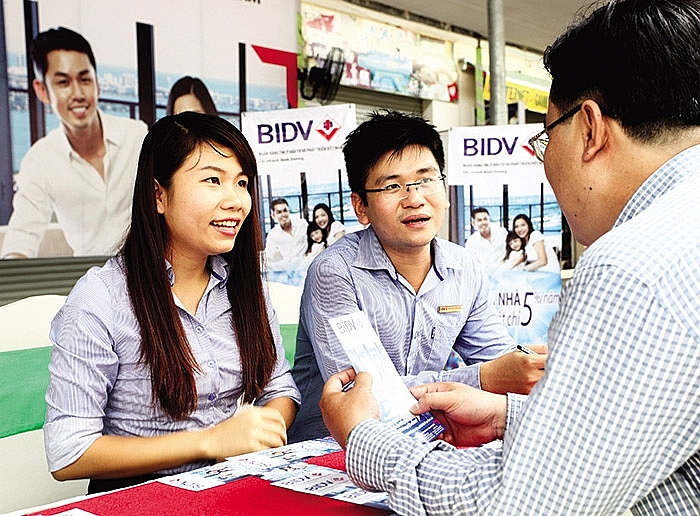Calls for FOL to be relaxed
 |
| A number of players in the banking sector believe that current rules stifle the flow of overseas capital, Photo: Le Toan |
In an effort to improve the capital adequacy ratio required by Basel II and the State Bank of Vietnam (SBV) by 2020, many Vietnamese banks are looking for overseas capital. A similar situation is occurring at state-owned commercial banks, whose biggest shareholder is the SBV.
Like other players in the market, the three state-owned lenders of Vietcombank, VietinBank, and BIDV are complaining about the foreign ownership limit (FOL), which they believe is obstructing their way of attracting overseas capital. Vietnam’s current Law on Credit Institutions states that all foreign investors can own at most 30 per cent of stakes of a domestic bank, and a strategic partner can only purchase a maximum 20 per cent stake of a Vietnamese lender. A foreign individual cannot acquire more than a 5 per cent stake.
According to Vietcombank chairman Nghiem Xuan Thanh, the lender has asked the SBV to relax the FOL as Vietcombank is trying to sell a 7 per cent of stake to international investors in 2019. As of January 2019, Japan’s Mizuho Bank is the only foreign strategic shareholder at Vietcombank, with 15 per cent of shares.
The situation is even more critical at VietinBank, whose foreign ownership has reached the 30 per cent ceiling. To preserve its financial health, VietinBank has consistently asked the Ministry of Finance to let it retain cash earnings. However, this bank’s chairman Le Duc Tho believed that stashing dividends is only a short-term solution, and the bank is also looking for FOL easing. “We hope that our FOL can be increased to 51 per cent after 2020,” said Tho.
VietinBank counts the Bank of Tokyo-Mitsubishi as its only major shareholder from overseas. The Japanese lender already owns 20 per cent of VietinBank, leaving no room for other strategic partners if VietinBank’s current FOL remains in place.
At BIDV, FOL restrictions are also slowing down its 15 per cent share sale to KEB Hana Bank of South Korea. Chairman Phan Duc Tu said at a recent conference in Hanoi that he hoped the SBV would remove these obstacles, as BIDV “wants to finalise the deal as soon as possible”. The bank’s restlessness is understandable, as it has been looking left and right for strategic partners for the past eight years.
A recent report from market researcher StoxPlus stated that without support from the government, it would be difficult for state-owned banks to meet the capital compliance deadline of Basel II. StoxPlus noted that these banks have been trying to issue bonds to ramp up their Tier 2 capital, but this method has suffered a number of setbacks because it cannot be higher than Tier 1, which represents shareholder equity.
Oanh Nguyen, banking partner at Baker McKenzie Vietnam, told VIR that without a major stake in Vietnamese banks, foreign institutions would not feel satisfied when partnering with domestic lenders. As a long-term partner, these overseas investors want “a bigger say” in order to improve corporate governance and business efficiency at these lenders.
However, in the case of state-owned commercial banks, raising the FOL can be trickier because it means the SBV has to relinquish some control. Specifically, besides their normal functions as a commercial lender, Vietcombank, VietinBank, and BIDV are also responsible for carrying out special requests by the SBV, which includes buy-outs of struggling banks, paying dividends in cash to help with the national budget, and other mechanisms to help stabilise Vietnam’s financial sector. As a result, a smaller stake in these banks will make it harder for the SBV to continue these orders, and the central banks’ requests in the future could be subject to approval from foreign shareholders.
According to experts, such concerns over Vietnam’s monetary security may prevent the SBV from offering all state-owned banks to outsiders.
In response to complaints from banks, the SBV is making tentative steps to ease the FOL. In particular, as part of the 2021-2025 development plan for Vietnam’s financial sector, overseas investors may be allowed to own a 49 per cent stake of state-owned banks. Foreign backers are allowed to take over indebted banks, although specific details remain vague.
Economist Bui Quang Tin was positive about the move, saying it is “absolutely necessary” to allow meaningful participation from foreign investors. “Still, we need balance. We should avoid hostile takeovers that can disrupt Vietnam’s financial sector,” said Tin.
What the stars mean:
★ Poor ★ ★ Promising ★★★ Good ★★★★ Very good ★★★★★ Exceptional
Related Contents
Latest News
More News
- Cashless payments hit 28 times GDP in 2025 (February 04, 2026 | 18:09)
- SSIAM and DBJ launch Japan Vietnam Capital Fund (February 04, 2026 | 15:57)
- Banks target stronger profits, credit growth in 2026 (February 04, 2026 | 15:43)
- Vietnam on path to investment-grade rating (February 03, 2026 | 13:07)
- Consumer finance sector posts sharp profit growth (February 03, 2026 | 13:05)
- Insurance market building the next chapter of protection (February 02, 2026 | 11:16)
- NAB Innovation Centre underscores Vietnam’s appeal for tech investment (January 30, 2026 | 11:16)
- Vietnam strengthens public debt management with World Bank and IMF (January 30, 2026 | 11:00)
- Corporate bond market poised for stronger growth cycle (January 28, 2026 | 17:13)
- Vietnam's IPO market on recovery trajectory (January 28, 2026 | 17:04)

 Tag:
Tag:




















 Mobile Version
Mobile Version